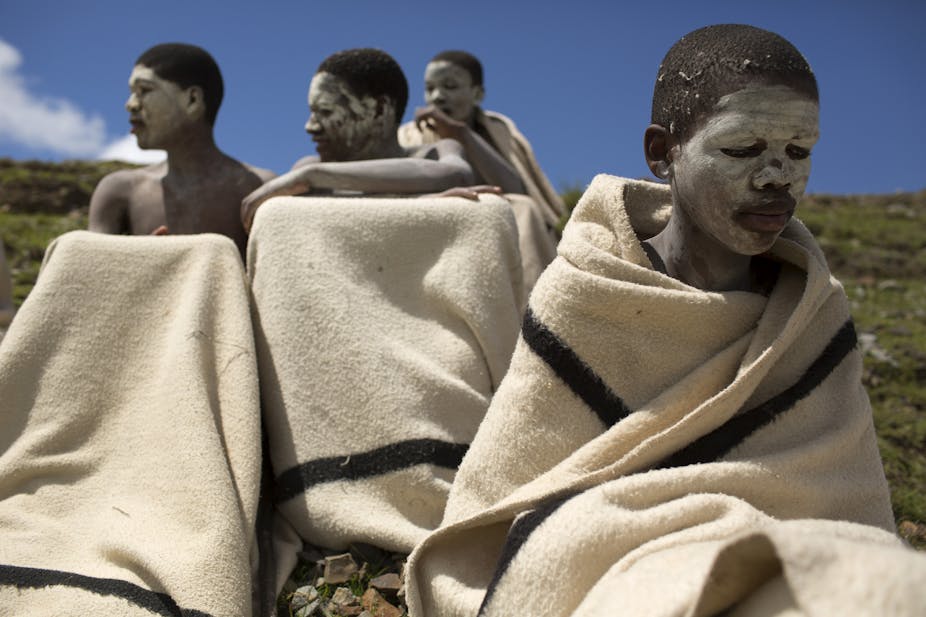At least 30 initiates are known to have died by the time the traditional male initiation season ended in South Africa this winter (2015). Most were from Xhosa communities in the Eastern Cape province.
Male initiation is a rite of passage from boyhood to manhood for some ethnic groups in South Africa. Ritual male initiation includes circumcision and the initiates spending about a month or longer in seclusion in the bush.
Initiation is deemed a necessary rite of passage marking a developmental phase for boys to adulthood among the amaXhosa, Bapedi, Basotho, Batswana, amaNdebele, VhaVenda, VaTsonga and amaSwazi ethnic groups. The initiation process is typically run by the family, with the boy’s father directing proceedings.
Traditional initiation involving circumcision remains an important topic in South Africa for several reasons. At the top of the list is the public health discourse and debates around prevention of initiates’ deaths. But initiation is also important because the practise is still relevant and employed in a range of urbanising communities across the country.
Deaths of initiates resulting from botched circumcisions, related infections and dehydration during this rite of passage are nothing new. And there is some evidence that they may be declining.
Deaths of initiates have attracted heightened attention from the government, civil society and the traditional custodians of the practice.
Save for girls, who are related to and who cook for the initiate, women are generally not involved in the traditional process. Women’s role could be described as that of cheer leaders. They participate significantly in the ceremonies to welcome the new men back home. Discussions around the meaningful involvement of women in the initiation process have been met with resistance from custodians of culture.
But gender politics, changes in family formations and the high number of single mother households are increasingly pushing some of the traditional boundaries around initiations.
Role of women
South Africa has a higher rate of single, women-led families than households led by men. Most South African children under five live with only their mothers.
As a result, the practises around male initiation are changing and beginning to encompass women.
We conducted interviews in the Eastern Cape to understand people’s perceptions and experiences of sexual and reproductive health rights.
The study is conducted in collaboration with the AIDS Foundation of South Africa, a non-governmental organisation that supports community-based initiatives to strengthen men and women’s access to sexual and reproductive health rights.
We interviewed men and women of different ages, but older that 16, in single-sex focus group discussions. We also interviewed key stakeholders such as officials in the departments of health, education, social development, a traditional healer and a traditional leader in the Flagstaff district of the Eastern Cape. The people of Flagstaff identify as amaPondo and their traditions slightly differ from those of amaXhosa in the Eastern Cape.
Our study (yet to be published) found people have mixed feelings about initiation. Some feel it is good but that the tradition has changed. Some felt as soon as an initiate required medical attention and went to hospital, they were no longer considered a traditional initiate.
They attributed the change and the undesirable outcomes to:
- underage initiates,
- incompetent traditional nurses, and
- substance use at the Ibhoma. The Ibhoma is a temporary hut built for the initiate in the bush.
Some problems were related to what the community perceived to be uncanny behaviours by the new men. For example, engagement in violent behaviour, disrespect for adults and increased alcohol drinking and use of other substances. One of the major findings was a concern about the health impacts of the initiation, chief amongst these the death of the initiate.
Dealing with the death
Our study shows that men and women are demanding that the government protect the boys and curb the death of initiates. One of the participants explained:
We are trying to end these deaths out there. I am saying everybody (should) start at (the) hospital and then go (their) separate … ways where a person is going to learn his own isiko (custom).
The custodians of traditional practices are speaking out against distortions or misinterpretations of culture that threaten young men’s lives.
The House of Traditional Leaders in the Eastern Cape has started advocating for safe initiation. In one case, traditional leaders openly endorsed and supported women’s involvement in pre-initiation camps to educate and socialise boys and ensure stakeholder commitment to the legal and safe operation of initiation lodges.
Historically, boys who died at initiation lodges or camps were buried there. The boy’s father would take care of the burial ritual while his mother would find solace knowing her husband had buried their child. These deaths were less likely to be reported to the general community.
But as times have changed, so has this practice. As burial rituals, including funerals, have been modernised, bereaved families wish to see and bury their loved ones.
We found that in the event of a death, the mother now demands to know how her child died, to see his body and hold the funeral in the community. The circumstances surrounding his death are now disclosed, despite the fact that the custom stipulates that initiation should not be discussed with the female relatives.
Historically, a father would know what cultural instruction had been imparted to his son during initiation. He could sanction disrespectful behaviour towards women. Research shows that in the absence of male authority figures and role models, women are speaking out against this and demanding that boys are taught respectful and risk-reducing behaviour.
This study’s findings are important in crafting a way for more research to better understand the role of women and mothers in initiation. As society changes, so are there changes in our cultures.
Dialogues are needed at a community level to find ways to include women in the initiation process. These dialogues should involve men and women, children and parents and custodians of culture, in particular the duty bearers within the House of Traditional Leaders.

